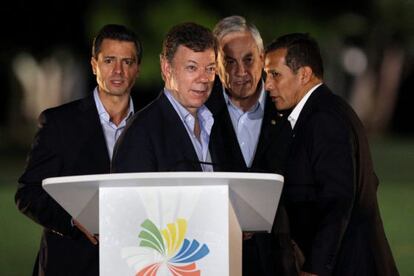Pacific Alliance foursome agree to lift most trade tariffs by July
Founding nations Chile, Peru, Colombia and Mexico set to welcome Costa Rica into bloc

The “founders” of the Pacific Alliance bloc — Chile, Peru, Colombia and Mexico — agreed on a June 30 deadline to come up with details of a far-reaching agreement that would lift tariffs on 90 percent of the four nations’ trade.
Colombian President Juan Manuel Santos, who hosted this week’s VII Pacific Alliance Summit in Cali, was the most optimistic, predicting that by July more than half of the four countries’ products will begin to circulate freely within the bloc. Chilean President Sebastián Piñera explained that the next month will serve to “fine tune” the agreement, including putting together a list of products that will be excluded from the free-trade accord. Santos had to ease the concerns of farmers and ranchers in his country by saying that the lifting of tariffs will in no way be “quicker” or “more aggressive” than what Colombia had already ironed out in other agreements with third countries.
The summit also served to boost to an ambitious regional integration process, and not only in the area of trade. The leaders agreed to create a tourist visa valid only for the four countries, and conduct joint tourism promotion campaigns. They also agreed to share embassies (the first combined ones will be established in Ghana and Singapore), and expand a network of joint trade offices.
Among the battery of agreements signed, one will create a cooperation fund and another, the launching of a new scholarship scheme for students from the four countries. There were also commitments to come up with fiscal exchange mechanisms to fight corruption and tax evasion.
While advances in integration were being made, the bloc also opened the doors to new members. Costa Rica, which will begin formal talks to join the alliance, is set to become the fifth member. On Wednesday, Costa Rican President Laura Chinchilla signed a free-trade agreement with Colombia, which was one of the prerequisites for her country to join. Countries that were given observer status were France, Portugal, Ecuador, El Salvador, Honduras, Paraguay and Dominican Republic, bringing to 16 the countries in this category, which includes Spain.
The leaders also publicly welcomed Ecuador’s interest in joining. The Quito government of Rafael Correa is formally linked to the ALBA Bolivarian leftist axis, an alliance with a rival ideological stance. Peruvian President Ollanta Humala, who initially was thought to be closer to the ALBA bloc, said he feels “comfortable” in the Pacific Alliance and seeks friendly relations with all countries in the region. The presidents also took advantage of the summit to touch on bilateral issues, such as the ongoing maritime dispute between Chile and Peru over fishing rights in the Pacific that is now before the International Court of Justice at The Hague.
Tu suscripción se está usando en otro dispositivo
¿Quieres añadir otro usuario a tu suscripción?
Si continúas leyendo en este dispositivo, no se podrá leer en el otro.
FlechaTu suscripción se está usando en otro dispositivo y solo puedes acceder a EL PAÍS desde un dispositivo a la vez.
Si quieres compartir tu cuenta, cambia tu suscripción a la modalidad Premium, así podrás añadir otro usuario. Cada uno accederá con su propia cuenta de email, lo que os permitirá personalizar vuestra experiencia en EL PAÍS.
¿Tienes una suscripción de empresa? Accede aquí para contratar más cuentas.
En el caso de no saber quién está usando tu cuenta, te recomendamos cambiar tu contraseña aquí.
Si decides continuar compartiendo tu cuenta, este mensaje se mostrará en tu dispositivo y en el de la otra persona que está usando tu cuenta de forma indefinida, afectando a tu experiencia de lectura. Puedes consultar aquí los términos y condiciones de la suscripción digital.









































